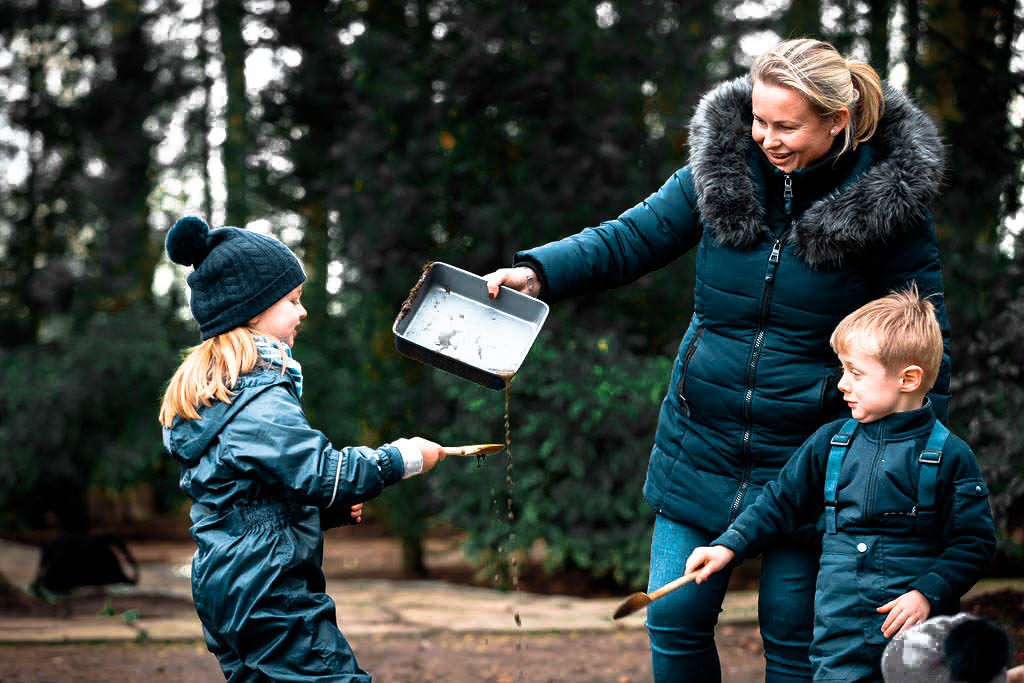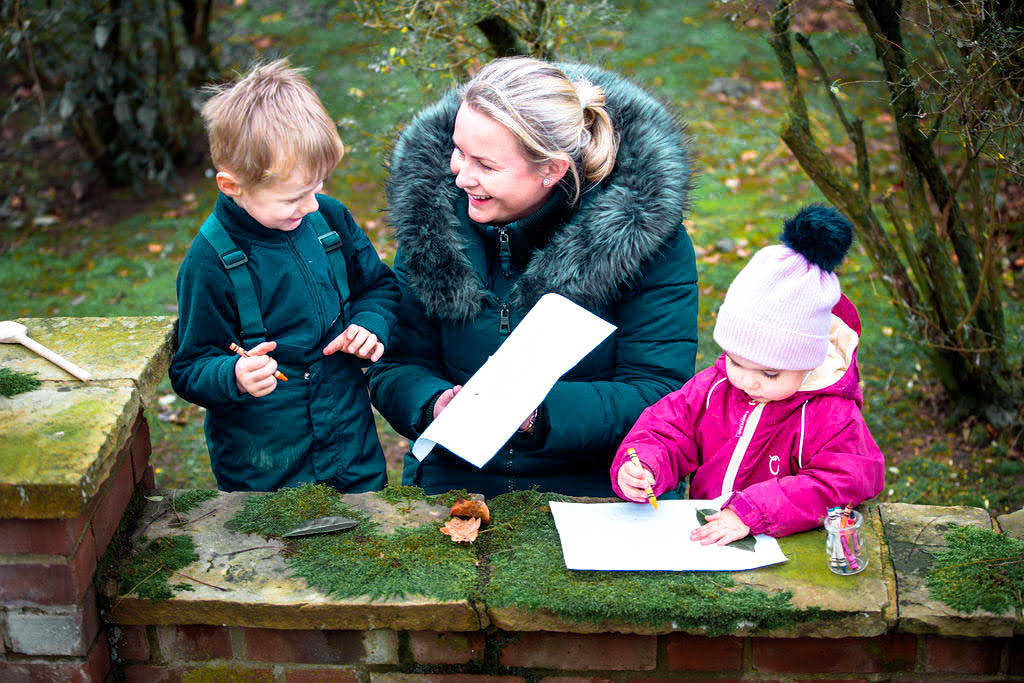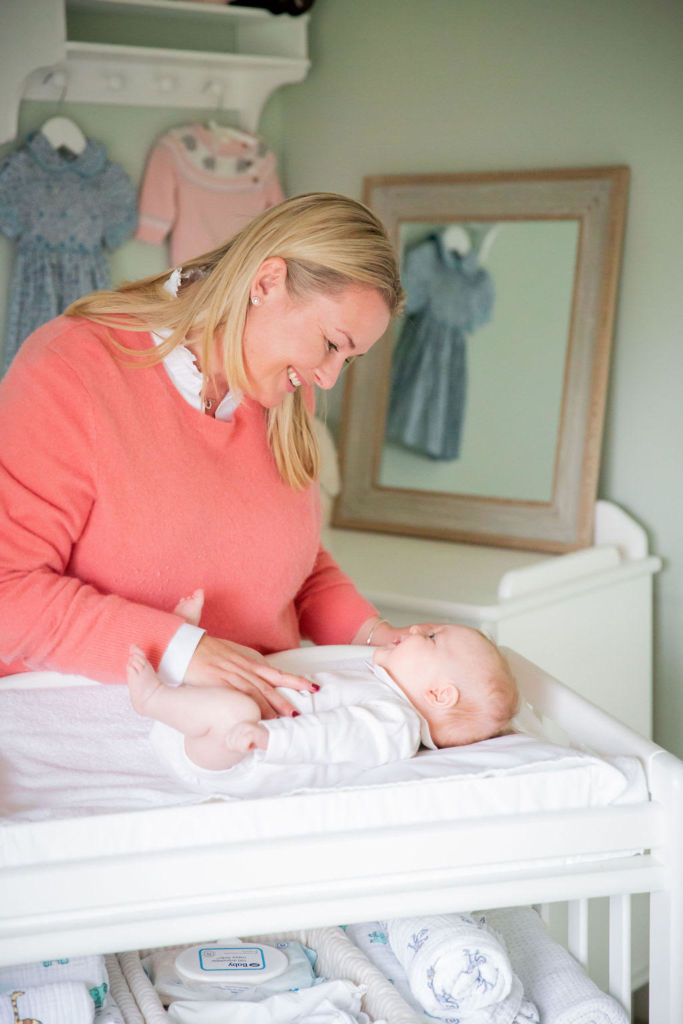Introducing Nanny Louenna
I’m Louenna, I’m a Norland Nanny and Maternity Nurse and have been looking after children for sixteen years. I have traveled all over the world helping families with their
little ones, including Dubai, America, Australia, and Sweden. My job is my passion – I love what I do. I believe that as nannies, we are huge influencers
on children’s lives, which is why we should always be a positive role model to them. I am in the final stages of releasing a childcare app (Nanny Louenna), which I hope will
help lots of families, especially working mums who need advice at their fingertips in an easy to digest format, by giving them tips and advice on everything from pregnancy
through to school-age children. The app is being dubbed “the Nanny in Your Pocket” and it will be constantly updated with new ideas from me.
Please tell us what you think are the differences between a nanny and a Norland nanny…
A qualified Norland Nanny has been through three years of training and has to work for a family for a year, meeting all Norland standards to become qualified – so it shows a high
level of commitment and competency. That’s not to say that nannies who have trained elsewhere can’t be highly committed and competent, but the value of Norland qualification is acknowledged worldwide.

How do people work and have children?!
With lots of help and support from others, especially from their chosen childcare provider. By being organised and learning to balance their work and home life. And definitely by having a sense of humour!
Have you looked after children in families where both parents work and do you think as a result of this the children ever suffer?
I have worked for many families in this situation and I don’t believe the children suffer, but that is because I make sure I give the children everything they need to thrive. The most
important thing to prioritise is who you are leaving your child with when you are at work. If you get that right, then children are very understanding that Mummy and Daddy have
go to work. Parents must find time to be with their children when not at work, remembering to put their phones down and just sit, listen and be with their children without any distractions.
What do children want from a home where both parents work and how can we work towards giving them this as best we can?
Children want love, security, continuity and a safe and happy environment. Once you have found the setting or caregiver where your child will feel happiest, remember not to
feel jealous or resent the person you have chosen so carefully for having a good time with your child in your absence. Feel happy and positive that your child is being cared for, as
this is truly the best thing for your child’s physical and mental wellbeing. You will always be Mummy (or Daddy)! Later in life, your child will look back and be grateful that you made sure they
had a happy upbringing. They will never resent that you worked.
For Mums who are about to have their first little one and are intending to go back to work, what would be your top 5 tips for preparing for this?
1. Stay in contact with your work colleagues, even if it’s just the odd email. That way, you won’t feel nervous or out of the loop on your first day back at work. This, in turn, will help you cope with the inevitable pressure of leaving your baby.
2. If you are breastfeeding, give your baby at least one bottle feed a day for the first month, so that they accept the bottle when you go back to work and don’t have the trauma of switching from breast to bottle.
3. Start to look into what childcare will work the best for you and your baby early on – it might be a nanny, a childminder or nursery – so the decision isn’t rushed and you find the right setting.
4. Think about what would happen if your child got sick. Would you be able to leave work and get to them quickly, or is there a member of family or friend who you could contact and trust to pick your child up in the case of an emergency? Who would look after them if they have to stay at home for a few days?
5. Plan what your day will be like. If you have to get up at a certain time to be able to drop your baby off at nursery, try to incorporate this routine into daily life before you go back to work so it’s the norm for your baby.

How do you not miss out when you’re working and you’re not with your children?
Keep in contact with whoever is caring for your child and ask them to send you pictures of their day. Ask them to always be honest with you and tell you if your child isn’t well or has a bump etc. Try not to rush away without speaking to the person who is looking after your child. Get to know them so you can have a relaxed and open conversation about each day, it’s nice to hear about the funny things they said, or learn if they did something new.
Speak to your child about their day, it’s a nice thing to do when you put them to bed -chat about what they enjoyed, what didn’t go so well, what they had for lunch etc.
How do you stay as organised as possible when working and have children in the following age groups…
Newborn
I really think that it would be difficult to work and look after a newborn baby. They really require all your attention, and you also need time to recover and adjust to
becoming a parent. Once a baby is in a relaxed routine and not needing so many feeds a day, working becomes easier as you know roughly what time they will sleep and when they will need all of your attention. The main way to stay organised with a baby is to have what you need to hand. A changing mat with a stock of nappies, wipes and cream within easy reach is essential. Create spaces in your house for baby things – a good tip is to clear a drawer in your fridge and keep it for baby bottles, beakers, clean cutlery. It keeps all your baby’s things in one place and declutters your work surface. Keep a nappy bag stocked with supplies so it is ready to go. Write a list of things you are running out of, so you don’t forget things when you are at the shops and have to go back again. Leave plenty of time to get to places. Babies love to poo or be sick when you’re in a rush!

Toddlers
1. Toddlers can create a lot of mess – they love to tip toys out of boxes! To stop feeling overwhelmed by toys everywhere, buy some storage boxes so that everything has its own
box – Lego, puzzles, dolls etc. At the end of the day ask your toddler to help you tidy the toys away into the right boxes. It keeps everything manageable and the house tidy, and helps
you to feel less overwhelmed.
2. Plan meals so that you buy what you need and don’t end up with out-of-date food in your fridge.
3. Batch cook. When you cook something, make double the quantity so you can freeze one for the following week.
4. If possible, pre-arrange and block out chunks of time during your week where you can take your toddler for some one-to-one time – maybe a trip to the park, or to a music group.
School-age
1. Pack school bags and lay out school clothes the night before school.
2. Get into a routine with homework so it gets done and out the way.
3. Write out a weekly plan of what needs to go to school each day, for example – Monday -PE kit, Tuesday – Swimming etc.
4. Buy easy to iron-on name labels so things can’t go missing.

How can you balance working from home and being a Mum at the same time?
Segment your day around their routine so you have set times when you are able to work. Plan phone calls around nap times. Be productive – avoid distractions like washing the dishes or watching television in those precious moments when your child is napping or contentedly playing with an activity so that you get your work done. Set up an activity for children around the kitchen table so they are happy and occupied if you have to do some work – you are still together. Block out parts of the day when you are definitely not working and your sole focus is your child.
Getting up early in the morning is a great way of getting lots done before your child gets up. The house is quiet, your brain is clear and rested – it’s your time. This will allow you lots more quality time to focus on your children.
If your place of work doesn’t have a crèche, how can you stay connected with your children throughout the day while you’re at work?
Communication is key, whether you are leaving your child at a nursery, with a nanny, childminder or at school. It’s so important to get a relationship with the person you are leaving your child with so you can discuss their development and anything that might be going on in their life. As a nanny, when parents are at work, I write a daily diary so that they know what we’ve been up to. This includes what and how a child has eaten, any medicine they’ve had etc. Nurseries and childminders often have a daily record to write what your child has been up to. To keep in contact with your child, you could arrange with the person picking them up a time to call or FaceTime when they come out of school or nursery. So that you are present in your child’s life even when not physically with them, and so they know that you are always thinking of them, leave them a little note on their bed that they can find, or on the kitchen counter with a snack.
What tips do you have for new parents to overcome tiredness and be able to function in their day jobs?
– Nap when you can. It’s not always possible but even half an hour at the weekend when your baby is napping will really help. If you have a baby and toddler, try to plan their afternoon nap together so everyone can have a rest.
– Eat well and drink lots of water – I find filling a bottle of water with ice and a natural flavour like a slice of lemon or cucumber and some mint helps me drink more.
– Get outside for some fresh air, it always makes you feel less sluggish. Just a ten-minute walk will help.
– If you can, eat dinner with the children so that once they have gone to bed you don’t have to think about cooking another meal. The evening is yours to enjoy and you can get to bed much earlier. It’s also healthier to eat earlier in the evening!
How can Mums in a working environment where others may not have children connect with those who do understand?
I find parents often meet other parents in NCT classes, who become friends because they have children who are the same age.
It’s also a good idea to go to a local baby group during your maternity leave so you meet some other mums with babies of a similar age. There are a range of classes for babies including baby massage, mum and baby yoga, sensory and music groups.

When you’re a working Mum and you have a full-time job, you’re basically working two jobs. How can you reduce the workload?
I think it’s hard to reduce the workload as such – there’s no denying you are going to be busy – but making life simpler so you can enjoy your free time with the children is so
important. My advice, so that mornings aren’t stressed or rushed is: Lay clothes out and pack school/nursery bags the night before. Get up ten minutes earlier and shower before your children wake so that you are ready and can then concentrate on getting them dressed and eating a good breakfast. Get into a routine so that everyone knows what they have to do and how much time they have so you’re not shouting at them to get in the car, or in a hurry because you’re late. Set up an online food order which is delivered weekly so you don’t have to spend part of
your weekend at a busy supermarket. Try to get your children into a nice routine so that they’re in bed at a reasonable hour. This means you have your evening to catch up on any work and hopefully find some time to yourself. Try and do something that’s just for you, even if it’s just reading a few pages of a book.
When it comes to housework, I think it’s best to get into a daily routine of putting a wash on when the children go to bed and hanging it out to dry before you go to bed so you
don’t end up with a huge load of washing to sort through on your weekend. Keep playrooms tidy and under control by separating toys into boxes so it’s easy to see where
everything goes at the end of the day. Ikea have brilliant storage solutions. If you can afford it, having a cleaner once a week who cleans the house and changes the
bedsheets is a godsend. It is a luxury but such a treat and really lightens your load. Don’t feel you have to say yes to every playdate or party invitation. Plan some weekends
where you are at home as a family where you can recharge and get on top of things. Simply going for a walk to the park and playing board games is a fun day for children and
they will be grateful for it too after a busy week at school. Lastly, offload as many tasks as you can so that you get to spend that time with your child.
Should everyone have a Norland nanny & what can we do if we can’t afford one?
Absolutely not! I have worked with some brilliant nannies who aren’t Norland-trained. When hiring a nanny the most important thing is to choose someone who has the same values as you. Check their references and spend time during interviews talking to them about how they would handle different situations.
Top 3 tips on …
-Starting school
1. In the weeks building up to your child starting school, talk to them about the fun things they will do there – playing with new toys, meeting new friends, reading new books and
playing in the playground. Be positive and presume they will enjoy being a big boy or girl at school – don’t project your own worries or fears on to them.
2. Go to any induction/taster days on offer so your child can envisage what their classroom looks like. The thought of school will be a lot less frightening if they know what
to expect. It’s also a great opportunity to meet the other children in their class and be introduced to their teacher. I think it’s a great idea to organise playdates with other
mothers and children so there are some familiar faces on their first day.
3. Preparing your child for school life starts at home. Simple tasks like sitting still and concentrating for short amounts of time will make the transition into the classroom much
easier. It’s good practice to have a few times during the day where your child has to sit without getting up until they have permission. This can be during dinner, whilst reading a story or doing an art activity. Make it fun, not a chore – play the Statue Game, where they have to sit without fidgeting for as long as possible. Every time you play this game it strengthens your child’s ability to focus, and if they already have the skill to sit and listen then it won’t be such a shock when the teacher asks everyone to sit down for storytime.

-Homework
5. Make a homework club, put up a little sign and make an area with sharpened pencils so it’s more fun for the children.
6. Have a little snack and a nice refreshing drink for them to have while they do their homework. I find it keeps their brain engaged and it’s also a little reward for them.
7. Get it done and out of the way so it isn’t in the back of everyone’s mind. The earlier you can get it done the better. Trying to do homework at bedtime isn’t a good idea, as everyone is tired, has less patience and less ability to concentrate – and that’s just the parents! I usually let children have a run around outside when they get home from school, then ask them to come in and do their homework with a snack so you then have time to make dinner before the evening gets too late.
When do children need us most?
*Stage in life – I think every single stage of a child’s life is important. However, I do think it’s very important to be with your children as much as you can in their first year as this is
where initial strong bonds are made.
*Time of day – Again, I don’t think any part of the day is less important, however, I do think it’s special if you are the first person your baby or child sees in the morning and the last person they see at night.
Best on the go meal?
A picnic! Picnics are so much fun and can be really varied. Cold pasta, sandwiches or wraps, crudités, fruit, flapjacks … a frozen yoghurt tube is great for keeping food cool in a lunch box and is a yummy pudding.
Fastest meal from scratch to make
If we get home later than planned and everyone is hungry and tired, my two go-to meals are either an omelet or a prawn stir fry. They can
both be cooked in ten minutes and are delicious. The ingredients depend on what’s in the fridge but this is a usual recipe:
Omelet:
Onion, cheese, egg. Put little ramekin pots with some bits in that the children can add to and build their own omelette. Popular ingredients are tuna, sweetcorn, tomato, courgette, ham, mushrooms, sausages and salmon.
Stir fry:
Cook the noodles in a pan of boiling water. In another pan, sauté some chopped onion, garlic and ginger in sesame oil. For speed and convenience, I always have frozen
chopped onion, garlic, and ginger in the freezer – it saves so much time and mess. Add the veg you have (chopped or grated carrots, courgette, red pepper, mushrooms etc.),
then throw in the prawns and noodles with some soy sauce and cook for a couple of minutes until the prawns are cooked through.
Best meal to freeze and defrost – Cottage pie! It’s the simplest dish to defrost, cook and serve with peas from the freezer and is perfect if you have nothing in the fridge. Mix
it up and make the meal with a sweet potato topping, it’s my absolute favourite comfort food and I don’t know many children who don’t love it. I have included lots of delicious
family meal recipes in the Nanny Louenna app, with some great hacks on how to create nutritious meals which can feed the whole family (from your baby to your husband/ partner!) when you don’t have much time.

Time seems to be the biggest hindrance in most working parent’s lives. How can they scrape back more of it?
It’s important to switch off from work mode and spend quality time with your children. Put your phone on silent and leave it in another room while you play or have a chat with your
children. Just your presence in the room when they know you’re there for them means a lot to them.
You don’t have to organise big outings for children every weekend, and they don’t have to do six school clubs a week. Keep things simple, home is where the heart is. Concentrate
on making a happy home where children can play and explore and feel safe and content.
Finance for the future
What can we do to assist our children financially as they grow?
I am a big fan of the Go Henry pocket money card. It’s a collaboration with Visa and allows you to pay your children (aged 6 – 18) pocket money, which they are able to spend.
Through an app, children can see their money building up and learn when they have enough to buy something they would like to buy. Parents can set tasks which when they
are completed funds are transferred to their child’s account. It teaches children independence and the value of real money.
What really is the most important thing to take away from this article?
Although it can be worrying in the run-up to going back to work, I find that children actually find it easy to understand when mummy and daddy are at work. There’s something about the word ‘work’ that sounds boring and mundane and so they don’t want to go with you! The most important thing you can do is make sure they are left in the care of someone who will love and nurture them, and create a bond with them so that they’re happy when you’re not with them. This means you don’t have to feel guilty about being a working mother, your child will thrive and hopefully, you will achieve a happy balance between work and home life.








No Comments